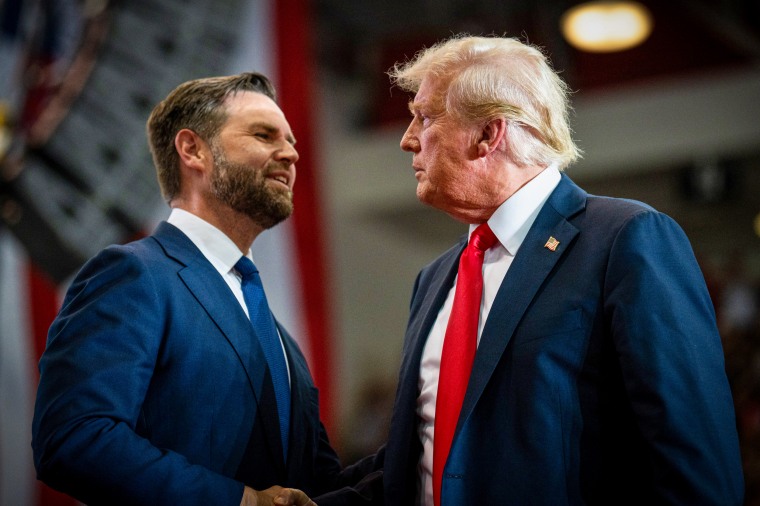When JD Vance released his memoir “Hillbilly Elegy” in 2016, which traced an impoverished Rust Belt upbringing and rise through the Navy and Yale Law School, it caught the attention of Donald Trump. In it, the Iraq veteran describes the worldview of his hometown at the beginning of the 21st century.
“Nothing has united us with the central structure of American society,” he wrote. “We feel trapped in two seemingly unwinnable wars, in which a disproportionate share of the combatants came from our neighborhood, and in an economy that has failed to deliver on the most basic promise of the American Dream – a stable wage.”
Now, Vance is Trump’s running mate ahead of the November elections and Republicans are polling well. Meanwhile, the US is involved in two different wars, in Ukraine and in the Gaza Strip (albeit without forces on the ground), and anyone who asks what the Ohio senator’s nomination means for America’s place in the world, if the Republican Party winning, it can start in Vance’s youth communities.
“The lodestars of his political alignment are economic populism, a degree of isolationism and a focus on the ‘forgotten man’ in US politics,” said Clayton Allen, US director at political risk consultancy Eurasia Group.
Ideological lodestars such as rejection of free market orthodoxy – once a central pillar of Republican Party economic policies – hostility toward immigration and most foreign involvement, plus a healthy dose of social conservatism. Vance, by embodying this combination, makes him the most visible supporter of a movement known as the New Right, currently on the rise in the Republican Party.
And since Trump rose to political prominence as a presidential candidate in 2016, he appears to enjoy challenging Washington’s long-standing consensus on foreign policy, casting doubt on the value of U.S. alliances, trade agreements, and vast U.S. military commitments. . Now, Vance has “doubled down on Trump’s worldview and put in better, more coherent words,” said Bronwen Maddox, CEO of the London-based international affairs think tank Chatham House.
“He’s essentially 100 percent Trump’s ideology, but 50 percent his age, and that’s his appeal,” Allen said.
More than in any other foreign arena, Vance sought to echo Trump on the war in Ukraine.
He strongly opposed the $61 billion military aid package for Ukraine that the Biden administration approved in April, and like his senior partner, Vance accused U.S. NATO allies of not paying their fair share to support Kiev. In doing so, he emphasized the thick vein of “politics of scarcity” that runs through its foreign policy, arguing that the US cannot equip Ukraine with enough materiel to contain an adversary as vast as Russia.
Vance described Ukraine’s ceding of territory to Vladimir Putin as being in “America’s best interests,” although he appeared more supportive than Trump of remaining in NATO.
Not long ago, most older Republicans would have found it unthinkable that a fellow party member would make such comments. They represent “a major departure from the old Atlanticist view that the U.S. is in lockstep with Europe to uphold a particular set of values and the security of the countries that represent those values,” said Maddox of Chatham House.
She also suggested that this view may come from Vance’s own military experience and the risk to American lives and money in places that don’t seem to appreciate that. As such, Vance is a product of his time.
While he praises the lessons of military service in “Redneck Elegy,” he more recently raised angry eyebrows with his speech at this month’s Republican National Convention, which attacked President Joe Biden for voting for the Iraq War when he was a senator.
Vance sought to link the last three decades of policies to an “establishment” exemplified by Biden, a Democrat, even though the policies for which he criticized the president were largely supported by Republicans.
“When I was in fourth grade, a career politician named Joe Biden supported NAFTA, a bad trade deal that sent countless good jobs to Mexico,” Vance also said during the RNC on July 17. in high school, the same career politician named Joe Biden gave China a trade deal that further destroyed good American middle-class manufacturing jobs.”

“When I was a senior in high school, the same Joe Biden supported the disastrous invasion of Iraq, and every step of the way, in small towns like mine in Ohio, or in neighboring Pennsylvania and Michigan, in other states On the other side of our country, jobs were sent abroad and our children were sent to war,” he added.
Vance’s isolationism doesn’t just send a message about a potential second Trump administration: His selection shows that, in the Republican Party at large, a genuine debate is underway about foreign affairs issues that for decades have been taken for granted, said William Ruger , president of the American Institute for Economic Research, a think tank based in Great Barrington, Massachusetts.
But observers disagree about whether Vance, who many say will sharpen Trump’s sometimes confusing foreign policy, represents a new vision or just a collection of ad hoc positions — he wants to cede Ukrainian territory, send troops to Mexico to fight cartels and arming Israel unconditionally. – which reflect the former president’s transactional approach to international affairs.
That question hangs over the ticket’s taste for a wide range of strongmen — Trump has embraced Brazil’s Jair Bolsonaro and Vance likes Hungarian nationalist and Kremlin friend Viktor Orban. It also highlights the dilemma Vance may find himself in due to his boss’s pronouncements on Taiwan.
While Vance told Bloomberg this month that “what we need to avoid more than anything is a Chinese invasion,” Trump complained to the same publication the same week about Taipei’s industrial successes and the cost of protecting the island.
“They took about 100% of our chip business. I think Taiwan should pay us for defense. …Taiwan gives us nothing,” Trump said.
This incompatibility suggests two elements of the Trump-Vance relationship.

The first: although Vance “may be the most influential vice president since [Dick] Cheney” in the George W. Bush administration, he will have to let Trump be Trump, said Allen of Eurasia Group. This may not be a problem as the two share a broad ideology rather than fixed policies, he added.
The second: The man who once compared Trump to Hitler is “a bit of a careerist,” Allen said. “He recognizes that aligning with Trump is the quickest path to the top.”
That’s not something Vance’s predecessor, Mike Pence, valued — a calculation that nearly had dire consequences.
The foreign policy views of Pence, vice president when Trump was in office, while not universally loved, were at least “mature” — they were informed by multiple terms that experienced the consequences of foreign policy becoming reality, according with Daniel Kurtzer, a former US Ambassador to Israel and now a professor at Princeton. Vance, on the other hand, brings “no foreign policy experience, certainly no specialized knowledge,” Kurtzer says, and will support his boss when needed.
China is less likely to be a source of disagreement.
Globalization driven by a booming Chinese economy led to the post-industrial plague that Vance describes in his memoir. Furthermore, tariffs against China and a deep distrust of Beijing’s international intentions enjoy broad bipartisan support. Experts expect Trump to maintain and perhaps raise rates and increase pressure on China over its global ambitions.
Also like Trump, Vance called for an immediate end to the war in Gaza, but rather than this being due to concerns about the Palestinian civilian death toll or a shift in support for Prime Minister Benjamin Netanyahu’s government, the position is motivated economically, according to Charles Hollis, a former UK diplomat to Saudi Arabia and Iran.

Trump “is not really a warmonger,” explained Hollis, who is head of strategic intelligence at Aperio Intelligence. “He seems to think that doing business is what matters and wars get in the way of that.”
Vance may have an even harsher view of the war in Gaza, Hollis said, noting that he was one of the few senators who tried to remove aid to Gaza from a broader Middle East support bill in April. If he takes office, Vance, who has “never had to think much about Israel,” may “find the need for more nuance” in his black-and-white view of the region, Hollis said.
This combination of Trump’s mercurial but hardline foreign policy and Vance’s perspective, which Princeton’s Kurtzer characterizes as viewing the world entirely through the prism of America’s borders and interests, could frighten potential U.S. allies.
At this point, a Trump-Vance administration is unlikely to reintroduce tariffs on Canada and Mexico, but the lessons of Trump’s first term will long remain in the memory of America’s allies. “There are countries all over the world saying, ‘Oh my God, if this is how the United States treats its friends, how is it going to treat others?’” said Chatham House’s Maddox.
That uncomfortable issues can have a real impact, especially in Europe, Maddox added: “Europe [may start] dealing more with China [and] taking a different tone towards Israel,” she added.
It’s a disturbing scenario that may be unfamiliar to Vance, with his year and a half as a junior senator from the Midwest. But it won’t be for Trump, who could become the first US president to serve two non-consecutive terms since Grover Cleveland, at the end of the 19th century. If he does, former diplomats and analysts say Vance — disjointed and hardline worldview or not — will ultimately follow his master’s voice.
This story originally appeared on NBCNews.com read the full story


































